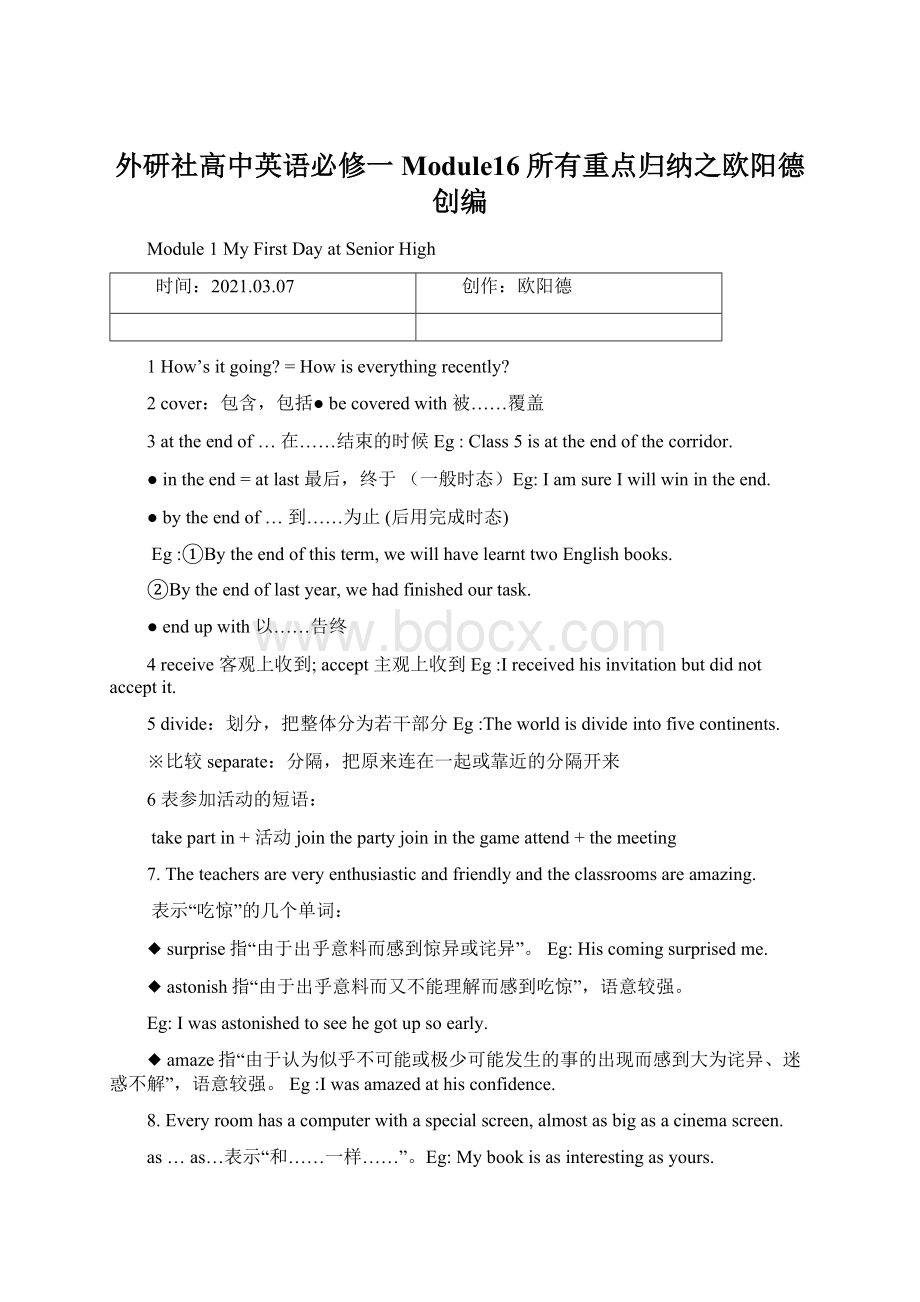外研社高中英语必修一Module16所有重点归纳之欧阳德创编.docx
《外研社高中英语必修一Module16所有重点归纳之欧阳德创编.docx》由会员分享,可在线阅读,更多相关《外研社高中英语必修一Module16所有重点归纳之欧阳德创编.docx(13页珍藏版)》请在冰豆网上搜索。

外研社高中英语必修一Module16所有重点归纳之欧阳德创编
Module1MyFirstDayatSeniorHigh
时间:
2021.03.07
创作:
欧阳德
1How’sitgoing?
=Howiseverythingrecently?
2cover:
包含,包括●becoveredwith被……覆盖
3attheendof…在……结束的时候Eg:
Class5isattheendofthecorridor.
●intheend=atlast最后,终于(一般时态)Eg:
IamsureIwillwinintheend.
●bytheendof…到……为止(后用完成时态)
Eg:
①Bytheendofthisterm,wewillhavelearnttwoEnglishbooks.
②Bytheendoflastyear,wehadfinishedourtask.
●endupwith以……告终
4receive客观上收到;accept主观上收到Eg:
Ireceivedhisinvitationbutdidnotacceptit.
5divide:
划分,把整体分为若干部分Eg:
Theworldisdivideintofivecontinents.
※比较separate:
分隔,把原来连在一起或靠近的分隔开来
6表参加活动的短语:
takepartin+活动jointhepartyjoininthegameattend+themeeting
7.Theteachersareveryenthusiasticandfriendlyandtheclassroomsareamazing.
表示“吃惊”的几个单词:
◆surprise指“由于出乎意料而感到惊异或诧异”。
Eg:
Hiscomingsurprisedme.
◆astonish指“由于出乎意料而又不能理解而感到吃惊”,语意较强。
Eg:
Iwasastonishedtoseehegotupsoearly.
◆amaze指“由于认为似乎不可能或极少可能发生的事的出现而感到大为诧异、迷惑不解”,语意较强。
Eg:
Iwasamazedathisconfidence.
8.Everyroomhasacomputerwithaspecialscreen,almostasbigasacinemascreen.
as…as…表示“和……一样……”。
Eg:
Mybookisasinterestingasyours.
9.TheteacherisaveryenthusiasticwomancalledMr.Shen.calledMsShen在此作定语。
10.We’reusinganewtextbookandMsShen’smethodofteachingisnothinglikethatoftheteachersatmyJuniorHighschool.
(1)表示“方法、办法”的几个单词:
◆method作可数名词,指(系统的、逻辑的)方法、办法。
后面常接of+动名词,不接不定式);作不可数名词,指秩序,条理,规律。
Eg:
①Heisamanofhavingaccurateandstrictmethods.
②Wemustgetsomemethodintoourofficefilling.
◆way为可数名词,后接不定式或of+动名词。
Eg:
①Wemustfindawaytosolvethiskindofproblem.
②Thenormalwayofcarryingoutsuchakindplanisverydifficult.
◆means单复数形式相同,其前有a,one,this,that,every等有时表单数意义,其前有such,these,those,all等有时表复数意义,其多指抽象或概括性的含义,后可接不定式,也可接of+动名词/名词。
Eg:
Thereisnomeansoffindingoutwhathappened.
(2)nothinglike+n./pron.
◆完全不像,一点也不像Eg:
She’snothinglikehermother.
◆没有什么能赶得上Eg:
There’snothinglikeaholidaytomakeonefeelrested.
11.Idon’tthinkIwillbeboredinMsShen’sclass!
Think表示意见和看法,其后的宾语从句中的否定词not被移到主句中,该现象被称为“否定转移”。
类似的动词还有:
expect,believe,suppose,imagine等。
Eg:
①Idon’tsupposethatshewillbebackuntilnight.
②IshallnotexpectyoutillIseeyou.
12Wedothisinafunway,withspellinggamesandotheractivities.
ina…way以……的方式:
Eg:
Childrenlikeplayinggamesinafunway.
※[辨析]inthisway/innoway/intheway/inaway/bytheway/ontheway
◆inthisway用这种方法、手段Eg:
Onlyinthiswaycanyouworkouttheproblem.
◆innoway决不Eg:
Wecaninnowaygiveintotheenemy.
◆intheway,也可以写成inone’sway,意思是“挡了某人的路”,“妨碍了某人”。
Eg:
①Theboxisjustinmywaytotheroom.
②Don’tstandinthewaywhenIamcarryingouttheplan.
◆inaway在某种程度上,有点Eg:
Youarecorrectinaway.
◆bytheway意思是“顺便说一下”,“顺便问一句”,也可以表示“在途中”。
多位于句首。
Eg:
①Bytheway,wherehashegone?
②Hestoppedforapicnicbytheway.
◆I’llbuysomebreadonthe/mywayhome.②Sheisonthewaytobecomingadoctor.
7.Inotherwords,therearethreetimesasmanygirlsasboys.
(1)inotherwords意为“换言之,换句话说,也就是说”。
(2)threetimesasmanygirlsasboys是比较结构。
其基本形式是“as+adj/adv原级+as从句”。
Eg:
①Thisroomisasbigasthatone.②MaryrunsasfastasJenny.
类似的结构还有“as+much+不可数名词+as从句”。
Hesavedasmuchmoneyashecould.
8.lookforwardto意思是“盼望”,后面跟名词或动词的ing形式。
Eg:
Idon’tknowwhatresulttheyarelookingforwardtoseeing.
※[联想、发散]英语中很多短语中的to为介词。
devote…to献身于……getdownto…认真考虑……payattentionto…注意……
stickto…坚持……getusedto…习惯于……leadto…导致……
9.LiKangisveryimpressedwiththeteachersandthetechnologyinhisnewschool.
Impress及物动词
(1)给予(人)印象。
Eg:
Theirmannersimpressedusfavorably.
(2)使(人、心等)铭记(事、物)(un,upon)。
Eg:
Thataccidentimpressedonmethenecessityoftrafficregulations.
(3)感动(人),打动(人心)(with,by)。
Eg:
Heimpressedtheworldwithhisadventure.他的冒险精神使全球的人深受感动。
10.Wouldyoumindansweringthequestionsforme?
----------mind+ing形式,不可以用不定式。
11.Attheendoftwelfthgrade,Americanstudentsreceivethehighschooldiploma.
attheend一般不单独使用,后常接of短语,意为“在……结束的时候”,表示时间点,因此句子多用一般时态。
Eg:
Attheendofthetalk,heexpressedhisgreatsatisfactionwithus.
※[辨析]
◆bytheend一般不单独使用,后常跟of短语,意为“到……结束的时候”,表示一段时间,因此句子多用完成时态,如过去完成时或将来完成时。
Eg:
Bytheendoflastterm,wehadlearnt1000words.
◆intheend后不可跟of短语,表示最终的结果,相当于finally或atlast。
Eg:
Theyfoundthelostboyintheend.
12.Theschoolyearisdividedintotwosemesters
bedividedinto指把一个整体分成若干部分,有时表示“平均分成几份”的意思。
◆separate…from把……和……分隔开,指由于事物阻隔而被分离。
Eg:
OnlyanarrowstraitseparatesNorthAmericafromSouthAmerica.
Module2MyNewTeacher
1.Goodteachersmakesurethateveryoneintheclassunderstands.
makesure一定要,保证做到,弄清楚
Eg:
Makesureyoufinishyourhomeworkontime.一定要按时完成作业。
※[辨析]sure&certain
(1)sure与certain的意思基本相同,但sure强调主语的心理状态,指主语心中无疑或十分确信、有把握,着重于人的内心世界。
Eg:
Hewassurethatthemanagermusthavereadtheletter.
(2)certain侧重说明有肯定的理由和证据,使人相信或确信,强调内心世界之外的证据。
Eg:
Itiscertainthathisbrotherwillcometohishelp.显然,他弟弟会来帮他的。
(3)当主语是人时,sure和certain常可替换,意思相差不大,但由于sure多表示人的内心世界,故其主语只能是人,且不能用来形容事件,所以当主语是表示事件的名词或代词时,或主语是it时,只能用certain。
:
Eg:
Itisn’tquitecertainwhetherhewillbepresentatthemeeting.
2.Ithinkperhapsshewas,asitwasherfirstlessonwithus.
As在这里是连词,,意思是“既然,因为”,多位于句首,常用来说明较为明显的原因。
Eg:
Astherearemanythingsforustodotoday,we’dbetteraskforsomehelp.今天我们要干的事情很多,我们就叫些人来帮忙。
※[辨析]because/since/as/for
都是表示原因或理由的连接词,在语气上由强至弱依次为becausesinceasfor。
◆because引导的从句多置于句末,表示直接的原因或理由,或产生那种结果的必然的因果关系,在回答why的提问时,必须用because作答。
Eg:
Thelightwentoutbecausetheoilwasout.
◆as与since引导的从句多置于句首,不过as表示十分明显的原因,只说明一般的因果关系,可译为“因为由于”,而since则表示稍加分析、对方已知的原因,一般译为“既然”。
Eg:
①Asitistoolate,you’dbetterstayhere.
②Sincethetownisfarfromhere,youmaygotherebybus.
◆for是并列连词,所引导的不是原因状语从句,而是表示理由的对等句子,是对前面所讲内容的补充和说明。
Eg:
Itmusthaverainedlastnight,forthegroundissowet.
3.Sheiskindandpatient,andexplainsEnglishgrammarsoclearlythatevenIcanunderstandit!
IhatemakingmistakesorpronouncingawordincorrectlywhenIspeakEnglish,butMrs.Lijustsmiles,sothatyoudon’tfeelcompletelystupid.
这两句中都使用了“sothat”,但意义完全不同。
“so…that”可译为“如此……以至于……”,有如下几种结构:
◆so+形容词或副词+that…EgHeransoquicklythatIcouldn’tkeepupwithhim.
◆so+形+a(n)+单数可数名词+that…Bobissotallamanthathecanreachtheceiling.
◆so+many/few+复数可数名词+that…或者so+much/little+不可数名词+that…
Eg:
Thereissolittlewaterleftthatonlysmallchildrenandpatientsweregivesome.
◆sothat相当于“inorderthat”,表目的。
Checkcarefullysothatanymistakeswillbecaught.
4.She’sverystrict–wedon’tdaretosayawordunlesssheasksusto.
(1)dare做情态动词时主要用于疑问句、否定句及条件状语从句中。
Eg:
①Idarenotgothere.②Dareyouaskhim?
(2)可用实义动词dareEg:
①Idon’tdaretogothere.②Doyoudaretoaskhim?
5.Thereareafewstudentsinourclasswhokeepcomingtoclasslate…
keepdoing持续不断地做某事,经常做某事Theykepttryinguntiltheysucceeded.
※[辨析]keepdoingsth/keepondoingsth/keepsbdoing/keepsbfromdoingsth
◆keepdoingsth,keepondoingsth.均含有“继续、重复”之意,许多情况下可以通用。
有时keepdoingsth描述客观事实,无感情色彩,可译作“持续地、一直不停地做某事”。
keepondoingsth则带有感情色彩,译“总是反复地做某事”。
Eg:
①Hekeptthinkingofthequestion.(描述“念念不忘”这一客观事实。
)
②Don’tkeeponthinkingofthesamequestion.(强调主观厌烦情绪)
◆keepsb/sthdoing表示“让某人/某物处于做某事的状态”
Eg:
Thebosskepthisworkersworkingdayandnight.
◆keepsb/sth.fromdoingsth阻止某人/某物做某事
Eg:
Theheavyrainkeptusfromstartingoutontime.大雨使我们不能准时出发。
6.appreciatevt.有如下几种意思:
(1)鉴赏,欣赏,品味,玩味(文学、艺术等)
Eg:
YoucannotappreciateEnglishliteratureunlessyouunderstandthelanguage
(2).感激(他人的好意等),感谢Eg:
Igreatlyappreciateyourkindness.
7.Duringscientificexperiments,sheexplainsexactlywhatishappeningandasaresultmyworkisimproving.
asaresult介词短语,意思是“因而,就这样”,相当于therefore。
Eg:
Shehadsomuchcolddrinkyesterday.Asaresult,shefellillandhadahighfevertoday.
※[归纳、拓展]
◆asaresult(of)作为……的结果
Eg:
Asaresultoftheflood,thousandsofpeasantslosttheirfood.
◆resultin引致,造成。
Eg:
Hislazinessresultsinhisfailureintheexam.
8.…butIthinkthatI’lldowellintheexamwithMrsChenteachingme.
(1)with+名词+副词Eg:
Withallthelightsout,theroomwasdark.
(2)with+名词+adjEg:
Withthedoorandwindowsopenwide,theroomwasverycold.
(3)with+名词+名词Eg:
InthenorthisScotland,withitscapitalEdinburgh.
(4)with+名词+介词短语Eg:
Themancameinwithabookinhishand.。
(5)with+名词+现在分词(名词和现在分词间为主动关系,状态正在进行)
Eg:
Withallthestudentsdoingtheirhomeworksilently,theteacherwalkedaroundtheclassroom.
(6)with+名词+过去分词(强调名词是-ed分词动作的承受者或动作已发生)
Eg:
Fromthewindowshecouldseeatalltree,withadogtiedtoit.
(7)with+名词+不定式(强调动作尚未发生)
Eg:
Withmachinerytodoallthework,thefarmishighlymechanized.
9.He’sgotsomuchenergy,thisisoneclassyoudonotfallasleepin!
他精力充沛,在他的课上你绝不会想睡觉(感到困倦)。
(1)请注意,这里的 in是不可少的。
可以把本句分为两句:
Thisisoneclass.Intheclassyoudon’tfallasleep.
(2)请注意,这里oneclass中的class既不解释为“班级”,也不和前面第4点中theclassreallylikesworkingwithher一样解释为“全班同学”,而是解释为“课”。
(3)这里fallasleep中asleep为形容词,只能作表语,而sleep则为名词和动词。
作为教师,请注意加“a-”的构词法,大部分是表语形容词,如:
alike,alive,alone,ashamed,awake,aware,etc.
Module3MyFirstRideonaTrain
(1)distance:
n.距离Eg①atadistance在远处②atadistancefrom离……有一段距离
③fromadistance在远处④inthedistance在远方,在远处
(2)supply:
v.供给,供应,补充Supplysb.withsth.=supplysth.tosb.
Eg:
Theysupplythehomelesschildrenwithfood.=Theysupplyfoodtothehomelesschildren.
其复数形式supplies指“日用品,生活必需品,补给品”等
1.RecentlyIhad